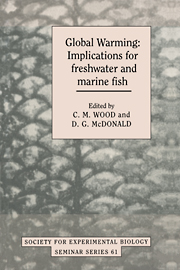Book contents
- Frontmatter
- Contents
- List of contributors
- Preface
- Temperature thresholds for protein adaptation: when does temperature start to ‘hurt’?
- Membrane constraints to physiological function at different temperatures: does cholesterol stabilize membranes at elevated temperatures?
- The effect of temperature on protein metabolism in fish: the possible consequences for wild Atlantic salmon (Salmo salar L.) stocks in Europe as a result of global warming
- Thermal stress and muscle function in fish
- Factors which may limit swimming performance at different temperatures
- Effects of temperature on cardiovascular performance
- Temperature effects on the reproductive performance of fish
- The effects of temperature on embryonic and larval development
- Temperature and growth: modulation of growth rate via temperature change
- Effects of climate change on cod (Gadus morhua) stocks
- Temperature effects on osmoregulatory physiology of juvenile anadromous fish
- Effects of temperature on xenobiotic metabolism
- Interactive effects of temperature and pollutant stress
- Behavioural compensation for long-term thermal change
- Thermal niche of fishes and global warming
- Index
The effect of temperature on protein metabolism in fish: the possible consequences for wild Atlantic salmon (Salmo salar L.) stocks in Europe as a result of global warming
Published online by Cambridge University Press: 05 November 2011
- Frontmatter
- Contents
- List of contributors
- Preface
- Temperature thresholds for protein adaptation: when does temperature start to ‘hurt’?
- Membrane constraints to physiological function at different temperatures: does cholesterol stabilize membranes at elevated temperatures?
- The effect of temperature on protein metabolism in fish: the possible consequences for wild Atlantic salmon (Salmo salar L.) stocks in Europe as a result of global warming
- Thermal stress and muscle function in fish
- Factors which may limit swimming performance at different temperatures
- Effects of temperature on cardiovascular performance
- Temperature effects on the reproductive performance of fish
- The effects of temperature on embryonic and larval development
- Temperature and growth: modulation of growth rate via temperature change
- Effects of climate change on cod (Gadus morhua) stocks
- Temperature effects on osmoregulatory physiology of juvenile anadromous fish
- Effects of temperature on xenobiotic metabolism
- Interactive effects of temperature and pollutant stress
- Behavioural compensation for long-term thermal change
- Thermal niche of fishes and global warming
- Index
Summary
Introduction
In fish, it is generally accepted that increased temperatures, within the thermal range for a particular species, will lead to increased growth rates providing that food is not limiting. Protein growth occurs when protein synthesis exceeds protein degradation. Therefore, understanding the effect of temperature on protein synthesis and food/protein consumption is fundamental to predicting the potential effects of climatic change on the growth performance of fish. Within the preferred thermal range, long-term exposure of ectotherms to lower or higher environmental temperatures may lead to a degree of physiological and biochemical independence from the acute effects of the alteration in environmental temperature, a process generally termed temperature compensation. The limits within which such independence (or compensation) may fall are ultimately determined by the genetic potential (genotype) of an organism. Since gene expression is dependent upon the synthesis of proteins, it seems likely that metabolic adjustments may be accompanied by changes in protein synthesis. In vivo rates of protein synthesis have most commonly been studied by measuring radiolabelled amino acid incorporation rates using the ‘flooding dose’ technique (Garlick, McNurlan & Preedy, 1980). This technique, and its experimental application in fish biology, have been covered in depth in recent reviews (Houlihan, Carter & McCarthy, 1995a, b; Houlihan et al., 1995c) and will not be considered here.
- Type
- Chapter
- Information
- Global WarmingImplications for Freshwater and Marine Fish, pp. 51 - 78Publisher: Cambridge University PressPrint publication year: 1997
- 20
- Cited by



